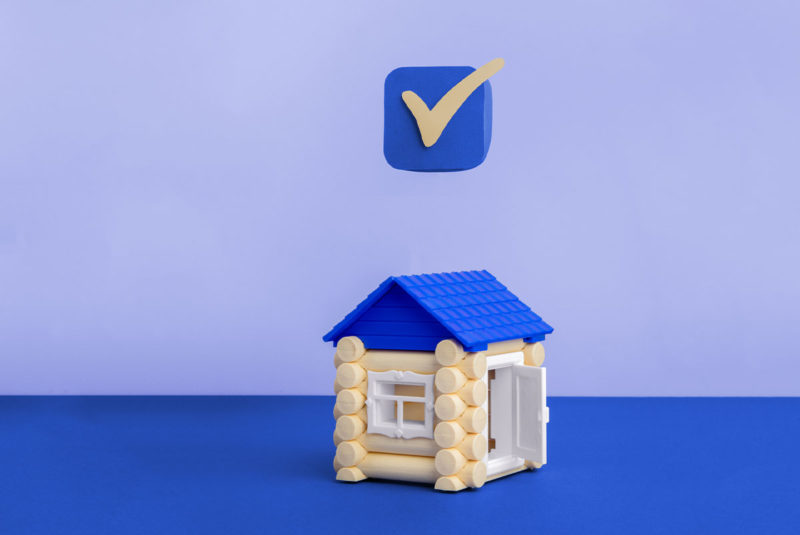Ready To Buy a Home?
Get Approved to Buy a Home
Rocket Mortgage® lets you get to house hunting sooner.
Laura bought her first home in Ohio in 2015. It was a cute cottage-style house in a decent neighborhood. It was the right place for her small family, but she always had plans to sell the home (hopefully at a profit!) and buy a bigger one in a nicer neighborhood.
When the housing market boom hit in 2020 and 2021, Laura realized it might be time to sell. She started her seller’s journey by finding out how much her home was worth in the new market. She was pleasantly surprised to learn that it was worth $65,000 more than she paid for it! (Hello, profits!)
If you’re thinking about selling, you’re probably wondering, “How much is my house worth?”
Future profits aside, there are other reasons why you’ll want to know how much your house is worth, including reasons related to taxes or refinance opportunities.
Before making any big financial moves with your home, it’s important to understand (a) its value and (b) how its value is calculated.
How Much Is My House Worth?
The value of your house can be calculated using three methods.
The first is fair market value. This is the value of the home that’s determined by similar homes on the market and what the buyer and seller can agree on. To arrive at a fair market value, the buyer and seller both typically need some knowledge of what’s going on in the housing market and what similar homes are selling for.
Let’s say six similar homes in a community have sold for prices ranging from $200,000 – $250,000 in the past year. When house number seven goes on sale, the buyer and seller will probably agree that fair market value for the home falls within that range. And no one is likely to argue that the value is actually $500,000.
When it comes time to sell your home, a real estate agent can typically provide some guidance on fair market value.
The second method is the appraised value. This involves getting a professional appraiser to look at your home and arrive at a value. Typically, third-party appraisers consider the value of similar homes in the neighborhood (and what recent homes sold for) as well as specific facts about your home and its features to come to their valuations.
And finally, there’s assessed value. This valuation is done on a county level and is determined by local tax assessors. The more your property is worth, the higher your taxes will be.
Need Tips? 6 Ways To Find Out Your Home’s Worth
Scheduling an appraisal or consulting with a real estate professional aren’t the only ways to figure out how much your home is worth. Whether you’re just curious or you’re ready to sell or refinance, here are six tips for figuring out your home’s value.
1. Use a home value estimator and plug in your address
You can use online tools to estimate the market value of your home. And it’s as easy as plugging in a few facts about your home or entering your address.
Home value estimators arrive at a valuation estimate or range based on algorithms and publicly available data. That includes recent sales information for area homes, tax assessments and other data related to home value.
Algorithms are the same technology Netflix uses to recommend a show or Instagram uses to curate your feed. With that in mind, experience is probably telling you that algorithms don’t always get it right. So, you’d be right to trust your instinct and your experience.
Home value estimators can incorporate things like sale values in the area, the basic details of your property and information that can be scraped online. However, it doesn’t take into account property renovations or the condition of the property. Working with real-life professionals can help you gain better insight. It will allow you to learn whether certain features are helping you build equity in your home.
2. Ask a real estate agent for a free comparative market analysis
Homeowners planning to sell their homes soon might get a head start on the process with a comparative market analysis (CMA).
Real estate professionals conduct CMAs by looking at the final sale price for homes that were recently sold in the area. They compare your home to those homes, including factors such as square footage, number of bedrooms and bathrooms, age and other amenities and features.
With all that data in mind, real estate pros come up with an estimate of what they think your home will sell for in the current market.
Look for a real estate agent with experience helping buyers and sellers in your area. While any real estate agent can perform a CMA, someone who’s familiar with buyer motivations and area market trends is more likely to come up with a more accurate estimate.
But, even in the best cases, a CMA valuation can be off. Sudden changes in the market, a buyer who loves the location or something like mold in your basement could skew the actual value from the estimate.
3. Check your county or municipal auditor’s website
The local tax auditor’s records are a valuable resource for homeowners who want to know how much they’ll pay in property taxes. And it can also give you an idea of the minimum value of your home.
While it doesn’t always work this way, real estate valuations to sell a home tend to come in higher than tax appraisals. That’s especially true in a booming market.
County or municipal auditors typically use information about what similar homes are selling for in your neighborhood or city to make these valuations. They usually don’t show up and inspect your home unless you’re disputing a valuation.
Because of this, auditor valuations can be missing critical information, like a major kitchen renovation or upgrades to appliances or your HVAC system. That’s one reason why the valuation may be lower than what your home might sell for. Only use this figure if, for some reason, you can’t pursue other avenues of figuring out your home’s value.
4. Identify trends with the House Price Index calculator
The Federal Housing Finance Agency’s (FHFA’s) House Price Index (HPI) calculator is an easy-to-use online tool that can provide some estimates on home valuation.
You enter the following information about your home:
- Your state
- When you purchased it
- When it’s being valued
- The original purchase price
The tool estimates what a house purchased at that price and time might be worth today, given the overall appreciation of home values in the same area or state.
Because the tool doesn’t consider specific factors about your home other than the purchase price and when you bought it, the estimate can be inaccurate.
This tool is best used to determine if there’s a chance your home value has appreciated, and not as a way to arrive at a hard range for that value.
5. Hire a professional appraiser
A professional appraiser comes out to your property to visually inspect features that might impact value. They also use data about home values in the area to come to an estimate.
An appraisal can cost hundreds of dollars, but it’s worth the price tag. In general, this is one of the most accurate ways to arrive at current home value. (FYI: In some selling or refinancing scenarios, there are some cases when you may have to use an appraiser who’s approved by your lender or the buyer’s lender.)
6. Get a property report
Have you ever written a book report? A property report is similar, except the subject is your home. This may be a good option for homeowners who want to gather as much data as possible about their property before putting it on the market.
Property reports include the following:
- Description of the land and the buildings on it
- Improvements made to the property and home
- Sales history
- Layout and design of the home (such as number of bedrooms and bathrooms and what other rooms are present)
- Statistics about the local market
- Demographic information about the area
- Information about local features (like schools and parks)
- Information about the title and whether there are liens on it
Many property reports also include a potential value range for the home. You do typically pay for a property report.
FAQs: Frequently Asked Questions
How often should I get an estimation done?
Use free online tools anytime you’re curious about the value of your home, especially if big changes are happening in the real estate market. However, with no real changes or market booms or busts, once a year should be enough.
You probably don’t need to pay for a formal appraisal or property report unless you’re planning to sell your home, want to dispute a property tax bill or want equity to refinance your mortgage.
Should I get an appraisal of my house?
An appraisal may be required by your mortgage lender if you’re refinancing your home.
But, you may want to proactively get your home appraised. Knowing the value of your home can help you price it for the market and negotiate with confidence.
You may also want to get an appraisal if your property tax bill changed significantly and you think the county auditor’s valuation is incorrect.
Can my home’s value change over time?
Yes, home values typically change over time. They can go up or down according to market factors. How you care for your home and whether you make improvements can also change its value.
What factors can contribute to a change in home value?
Home value can change based on things you do and things that are out of your control. Some factors that can contribute to home value include:
- The housing market
- The overall economy
- The state of the job market
- Interest rates
- Whether there’s a strong demand for homes
- Renovations you made to kitchens and bathrooms
- Adding on more living space (like an extra bathroom or bedroom)
Take the Guesswork Out of Estimating Your Home’s Value
Determining the value of your home doesn’t have to be a guessing game. With so many tools available, you can start researching home values today. The more information you have, the better standing you’ll have to make better decisions – especially when it comes to selling your home or refinancing your mortgage.
Looking to make a change?
Whether you want to buy a house, refinance or take cash out, you’re not alone. The experts are just a click away.
The Short Version
- Home values change over time and can be impacted by market forces and your own actions
- Online tools can help you get an idea of what your home might be worth in today's market
- Professionals like real estate agents and appraisers can provide you with the most accurate home valuations




